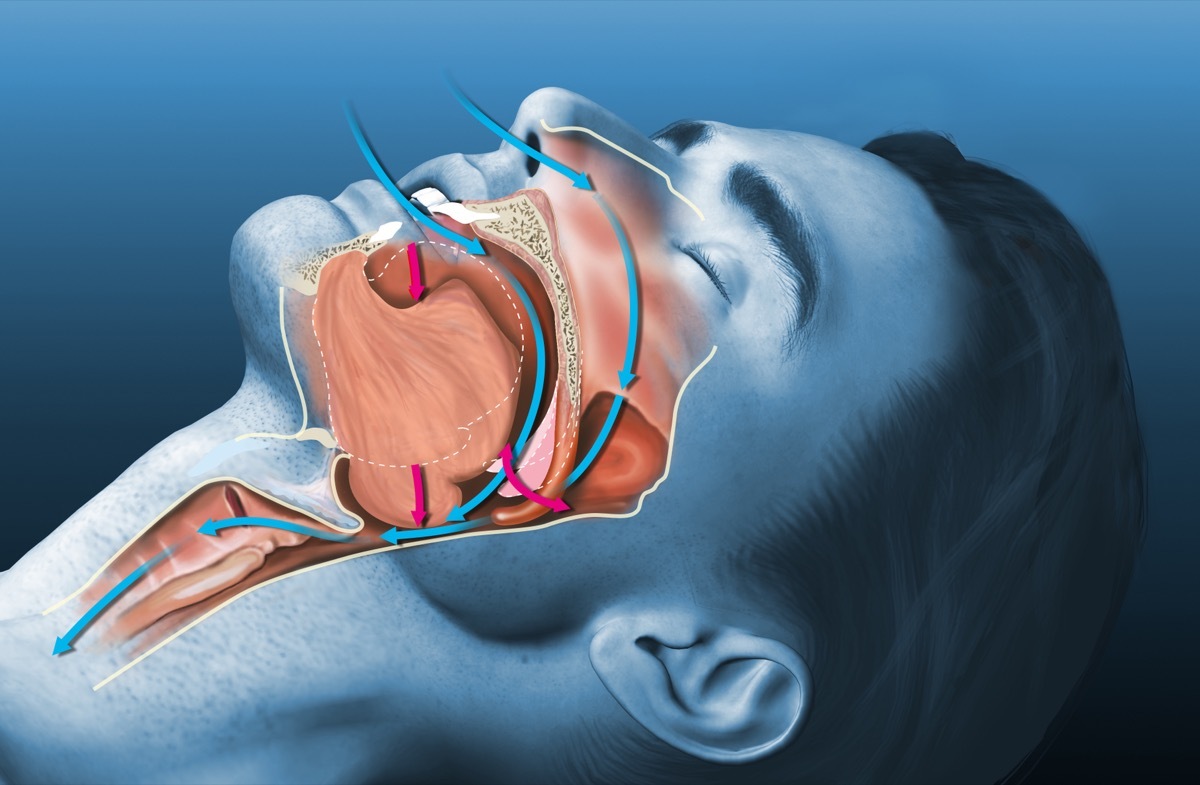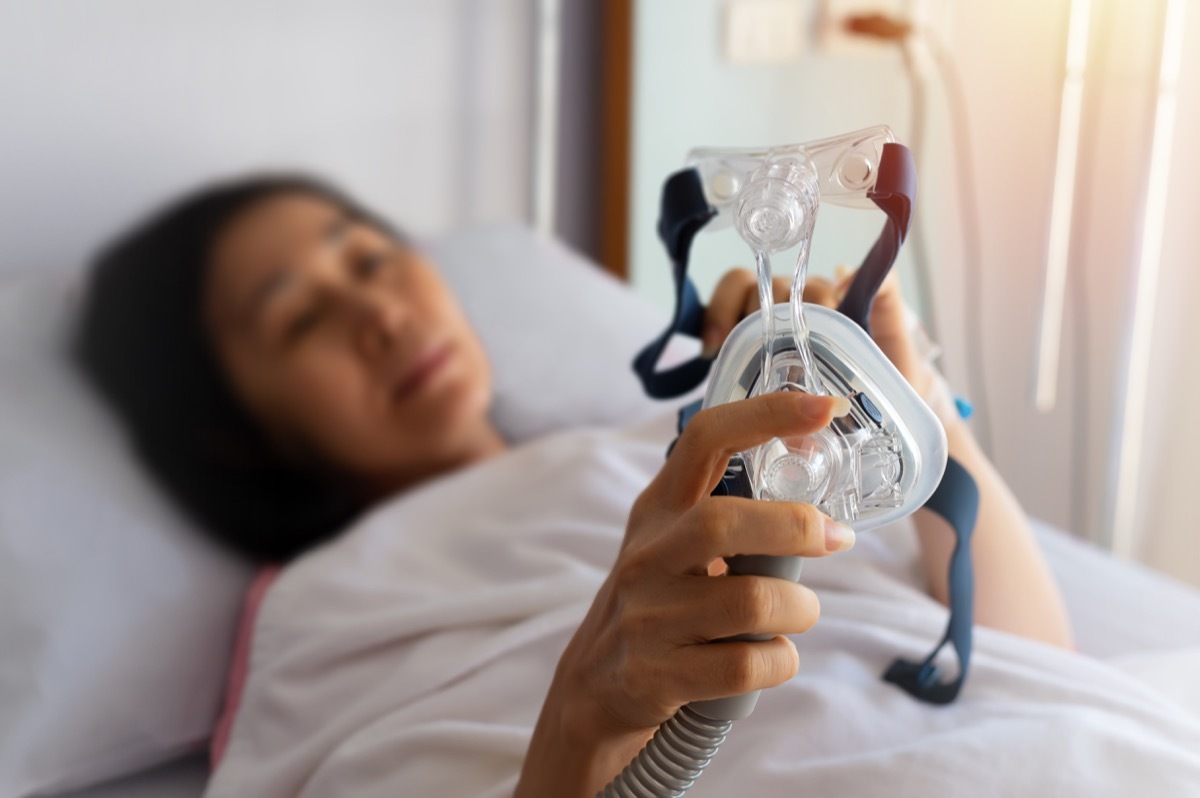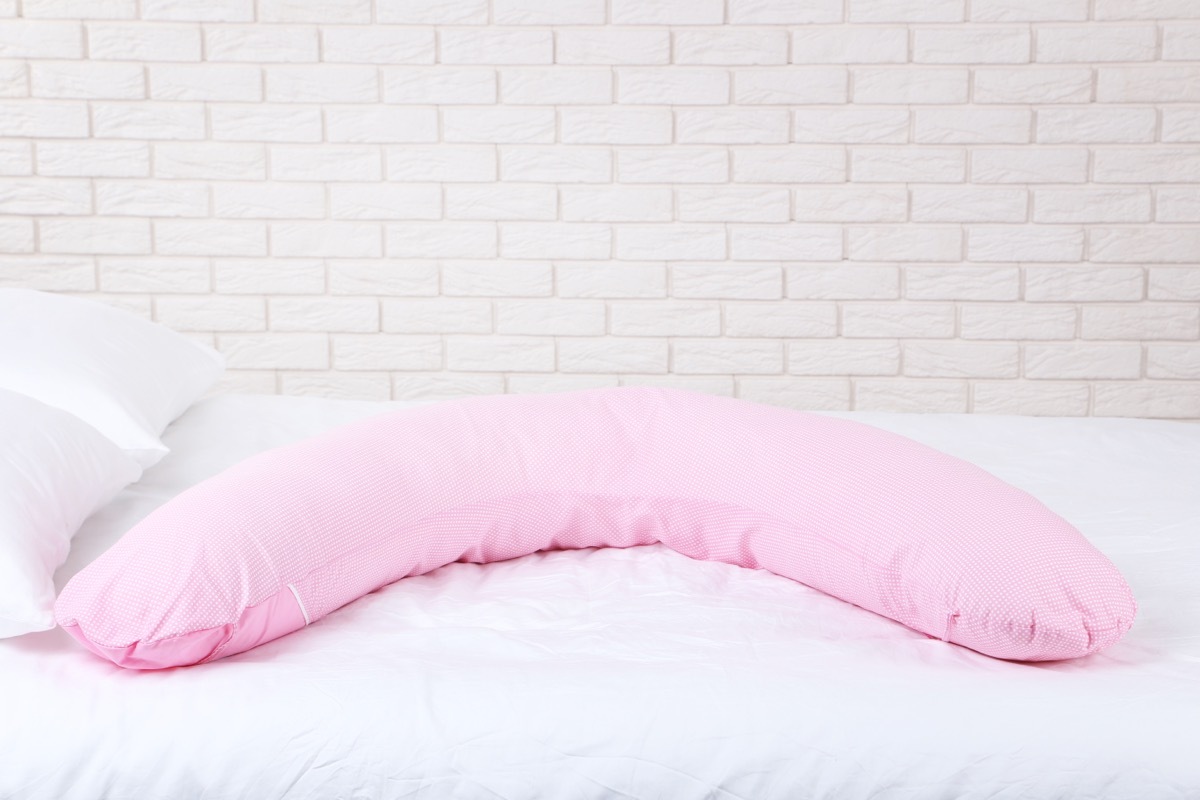Kung gagawin mo ito sa gabi, ang iyong panganib sa sakit sa puso ay pumapasok
Ang iyong mga gawi sa pagtulog ay maaaring maging tanda ng isang malubhang kalagayan sa kalusugan.

We all have a bad night's sleep from time to time, but if you're regularly missing out on good rest, it could have serious health consequences. Sometimes, however, you might not even notice anything is amiss—and that lack of awareness means you've failed to notice a major warning sign for your heart health. Doctors say that one nighttime habit in particular signals real trouble when it comes to heart disease. Read on to learn about this nocturnal red flag, and what you should do if you're affected.
RELATED: Not Doing This Before Bed Could Be Hurting Your Heart, Experts Warn.
Snoring is a common problem with a number of causes.

If you snore, you might not even realize it—until a bed partner complains, that is. "Snoring is caused by vibrations in any area of the upper airway (the passageway from your nose and mouth down to your trachea)," says Nithin Adappa, MD, the surgical director of the Penn AERD Center and associate professor in the Department of Otorhinolaryngology at Penn Medicine. "This can be from obstruction in the nasal passage, the soft palate, or the base of the tongue."
Snoring often becomes more pronounced as we age, he adds, as the soft tissue in our airway tends to relax more when sleeping as we get older. The Mayo Clinic reports that these other factors can increase snoring: alcohol consumption, having a narrow airway, nasal problems, a family history of snoring or obstructive sleep apnea, and being overweight.
RELATED: Sleeping in This Position Could Be Hurting Your Heart, Studies Say.
But your snoring could be a sign of sleep apnea.

Ask your bed partner—or record yourself—to figure out the intensity of your snoring. If it's on the mild and intermittent side, you likely don't have to worry about health concerns lurking beneath the surface. That said, heavy snoring could be a warning sign of sleep apnea, per Sleep Foundation. "Other signs of sleep apnea include waking up at night feeling as though you are gasping for air, excessive daytime sleepiness, excessive waking up at night, and a bed partner who notes periods of sleep where breathing appears to have stopped," says Adappa.
Quick medical lesson: There are actually three forms of sleep apnea, according to Medical News Today. Those include central, obstructive, and complex. Obstructive sleep apnea (OSA) is the most common form—affecting between 4 percent and 50 percent of the population.
If your snoring does reveal that you have OSA, you could be at risk for heart disease

"If a person has obstructive sleep apnea, they can have an increased risk of heart disease," says Marilene B. Wang, MD, head and neck surgeon at UCLA Health. "The increased work of breathing during sleeping and stoppage of breathing (apnea) results in a drop in the oxygen level in the blood and strain on the heart."
And it's not just heart disease you have to worry about. "OSA, if left untreated, can lead to serious health issues including high blood pressure, diabetes, stroke and heart problems, such as heart attack, heart failure, and enlarged heart," says Dana L. Crosby, MD, department chair and director of otolaryngic allergy at Southern Illinois University School of Medicine.
More specifically, 2008 research published in the Journal of Clinical Sleep Medicine found that obstructive sleep apnea increases the risk of heart failure by 140 percent, the risk of stroke by 60 percent, and the risk of sakit sa puso by 30 percent.ae0fcc31ae342fd3a1346ebb1f342fcb
RELATED: For more health advice delivered straight to your inbox, sign up for our daily newsletter.
This is when to see a doctor about your snoring.

When the snoring has become bothersome to you or your partner, it's totally reasonable to see a doctor and ask about possible treatments, Johns Hopkins Medicine notes. If what we're describing as sleep apnea sounds more like your current condition, then you should absolutely see a doctor now.
"If a doctor suspects sleep apnea, they will likely recommend a sleep study also known as a polysomnogram. Sleep studies are used to diagnose sleep apnea," explains Crosby. "Once sleep apnea is diagnosed, another polysomnogram with a titration study can be done to determine the settings for a continuous positive airway pressure device (CPAP). CPAP is a common device that is typically the first step to treat sleep apnea. This machine blows air in during sleep to help keep the airway open rather than allowing it to collapse."
There are both surgical and nonsurgical treatments for snoring and sleep apnea.

Ang mga nonsurgical treatment para sa OSA ay katulad ng mga para sa hilik sa pangkalahatan. Maaari molimitahan o iwasan ang alak,subukan ang isang wedge o body pillow., ogamutin ang nasal congestion. Maaaring mayroon ka mula sa isang malamig o alerdyi, ayon sa isang bilang ng mga eksperto.
Maaari ka ring mawalan ng timbang. "Habang nawalan tayo ng timbang, ang mga pader ng lalamunan at dila ay nagiging mas payat at ang paghinga ay nagpapalawak," paliwanagOfer Jacobowitz., MD, PhD, Of.Ent at Allergy Associates. sa New York City. "Ang kabaligtaran ay totoo rin, kaya ang simpleng snorer ngayon ay maaaring bumuo ng pagtulog apnea na may timbang na nakuha."
Tulad ng para sa kirurhiko paggamot, ang mga patuloy na sumulong sa oras. "Sa pangkalahatang operasyon ay tapos na upang mabawasan ang labis na tisyu tulad ng napakalaki tonsils, o mahabang palates, o sa tuwid na mga istraktura sa ilong," sabi ni Crosby. "Ang mga operasyon ay talagang inirerekomenda lamang para sa mga kanino ang CPAP ay hindi epektibo o para sa mga hindi maaaring tiisin ang aparato. Ang CPAP ay kasalukuyang ang gintong pamantayan ng paggamot at lubos na epektibo."
Kaugnay:Kung ang iyong mga binti pakiramdam tulad nito, makakuha ng iyong puso check.

Tiyak na hindi niya gusto kung ... 8 mga aksyon ng lalaki na nagsasalita tungkol sa isang walang malasakit na saloobin ng isang tao

Kasaysayan ng pakikipag-date ni Jennifer Lopez: Mga asawang lalaki, boyfriend at fiancés
